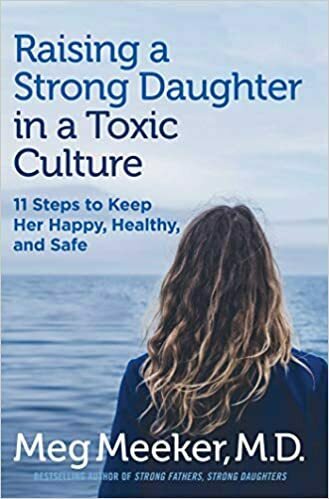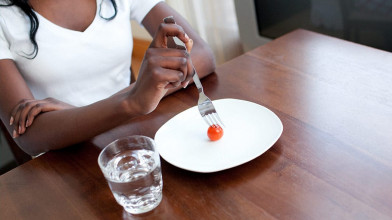Preview:
Dr. Meg Meeker: So, a healthy mother is a one who knows who she is, who knows that she’s a woman created by God, who knows that God, Christ is her everything. And if she had nothing in the world, she would be okay.
End of Preview
John Fuller: Dr. Meg Meeker is a pediatrician and she cares deeply about the wellbeing of young girls in our rather toxic culture today. Thousands of girls have come through her office, and she’s seen the challenges and the heart ache that they and their parents often face. Dr. Meeker is our guest today on Focus on the Family. And your host is Focus president and author, Jim Daly. Thanks for joining us. I’m John Fuller.
Jim Daly: John, today we’re going to offer help. Actually, Dr. Meeker will offer help to parents who have daughters. And that describes a lot of our listeners, probably about 50% will have daughters, maybe more. I do not have the pleasure of having a daughter, so my ears are wide open today. I do have the responsibility to prepare my boys for dating daughters and to respect them and that’s something Jean and I are certainly attempting to do with our own sons. Many young women, girls, are suffering from a, a variety of things, whether that’s eating disorders or, uh, just low self-esteem, anxiety, depression, whatever it might be. And that’s bad news and one of the reasons, again, that we wanted to bring this great content to you. The good news is that if you’re a loving, intentional parent, you can make a huge difference in your daughter’s life. And we’re gonna help you lay that foundation today.
John: And, uh, Dr. Meeker has been a pediatrician for more than 30 years. Uh, she’s, uh, written a number of books, speaks a lot. Uh, and we’re so glad to have her here today. We’re gonna be talking about a, a new book that she’s done called Raising a Strong Daughter in a Toxic Culture: 11 Steps to Keep Her Happy, Healthy and Safe. And we do have copies of that here at focusonthefamily.com/broadcast.
Jim: Dr. Meg, welcome back to Focus. It is so good to see you.
Dr. Meeker: Well, thanks for having me, Jim. I really enjoy being with you and John. It- it’s just like we’re sitting at-
Jim: Yeah.
Dr. Meeker: … in a kitchen table, enjoying each other-
Jim: (laughs)
Dr. Meeker: … having-
Jim: That’s right.
Dr. Meeker: … coffee. And I really- and I appreciate all the work that you guys are doing-
Jim: Oh man-
Dr. Meeker: It’s a- it’s a great time in our culture to do this great work but it’s hard-
Jim: Yeah. It is hard. And I so appreciate what a great title Raising a Strong Daughter in a Toxic Culture. Many parents are leaning in right now. I’m gonna start with the big question. What do we have to do as parents, uh, as moms and dads, to help our daughters survive in this toxic culture? That’s a big one.
Dr. Meeker: It’s a big one. I think that it frightens parents. I think a lot of parents, particularly younger parents that I see now, are very afraid. They’re-
Jim: Yes.
Dr. Meeker: … very afraid of what’s going on in the world in-
Jim: It’s bubble wrap time.
Dr. Meeker: It is.
Jim: And you can’t do that.
Dr. Meeker: You can’t do that. You can’t do that. And so, one of the things that parents really need to do, and this is a hard thing, I’m- I try to get parents to understand, is to really fully understand the impact that they have on their kids.
Jim: Mm.
Dr. Meeker: Because parents feel they need to send their kids other places to get good influence. Like, you know, have a soccer coach be an influencer. Maybe have the youth pastor be a good influencer. You know, the piano teacher. Um, and that’s all good. But really what it comes down to is that developing a strong, deep relationship with a father with a daughter or a mother with a daughter that’s what’s going to change that daughter and root her so that when she hits her 20s, she has her wits about her. She has a faith. And she knows who she is.
Jim: In fact, you, uh, point out in the book four key questions that moms and dads need to answer for their daughters. What are those four?
Dr. Meeker: Well, the- uh, Jim, the first question is where did I come from? And then the second is am I valuable and significant? The third is there a moral standard in the world? And finally, where am I going? Now parents will hear me say that and they’ll think, “Whoa, those are pretty existential, philosophical questions.”
Jim: Yeah. What does it mean to do those-?
Dr. Meeker: What does it mean?
Jim: … things?
Dr. Meeker: But I will tell you, most kids that I see and talk to truly don’t understand why they’re alive. And they don’t know where they came from, and they don’t know why they’re here.
Jim: Well, let’s role play. I mean, you’ve had thousands of girls come through your medical office, right?
Dr. Meeker: Yes. Yup.
Jim: So, even with your own daughters when it’s where did I come from, what do you say as a mom?
Dr. Meeker: Well, I say y- before you were born, you were crafted, created and known by a loving father. So, life for you began long before I knew you. So, you were made for a very specific purpose. And then you came to the world. And you were made to, to be in relationship.
Jim: Right.
Dr. Meeker: And to be in relationship with God and me and dad and your brothers and sisters. And even that, we know that girls are craving relationship. That’s why they’re going to social media.
Jim: Yeah.
Dr. Meeker: But we don’t teach them that. So, you’re born for a relationship. You’re born for a purpose that wasn’t designed by me or dad. But it was designed by God. So, let me help you walk that way. But it sounds very simple, but most girls don’t know that. They just-
Jim: Well, and have it reinforced. You know?
Dr. Meeker: Exactly.
Jim: They may be wondering about it.
Dr. Meeker: Right.
Jim: And it does address the where did I come from? Am I valuable and significant? Which is so core, in my opinion, watching daughters. Again, I don’t have daughters. But I think that’s something they seek out even more than boys-
John: Hm.
Dr. Meeker: They do-
Jim: … at that age.
Dr. Meeker: They do.
Jim: Um, but that big question is there a moral standard? You know, I’ve heard sociologists talk about the fact that women actually control the lever of the civility in a culture.
Dr. Meeker: Mm-hmm.
Jim: Because they tame- and I don’t mean to reduce this to instincts or anything like that. But women influence men heavily-
Dr. Meeker: Mm-hmm.
Jim: … and they have a number of assets to do that. Intimacy, emotionally. Intimacy physically.
Dr. Meeker: Right.
Jim: Women are the control factor.
Dr. Meeker: Right.
Jim: They’re the ones that either say yes or no. So that question, is there a moral standard, is so critical to a daughter. How do you answer that one?
Dr. Meeker: Well, because girls don’t feel there is one because-
Jim: Well, they’re told there isn’t.
Dr. Meeker: … they’re told there isn’t one and I saw the shift of the moral standard from the 1970s to the 80s and 90s- Old enough to have seen what happened where- when women were said, um, “You don’t have to go this way. It’s fine- y- you know, with the sexual revolution, you can say yes to anything. It’s your choice.” But really, it ended up exploiting women terribly. So, but what I’m trying to say in the book is as adults, we can work through, okay, we don’t have a moral culture, but I have moral standards. This is what I wanna do. But kids can’t. Kids are very concrete thinkers. Okay, well, if that girl says … Um, if she’s in the third grade and she comes in and her name is Tammy. And the teacher says now she’s Tommy. And I don’t understand this then something’s wrong with me. And they, they lose their way.
Jim: Huh.
Dr. Meeker: They lose the ability to say, “What am I seeing? What is right? What is wrong? What is up and what is down?” And it’s very, very confusing for them because they, they need a path to stay on and move forward. And when you take that path away, they literally feel like they’re floating in no man’s land.
Jim: Right. And they’re easy prey for-
Dr. Meeker: Easy, easy prey-
Jim: … a culture that is looking to devour them-
Dr. Meeker: Exactly.
Jim: … if I could say it that way. The evil-
Dr. Meeker: Yes.
Jim: … in the culture.
Dr. Meeker: Exactly.
Jim: Meg, let me … And we’re gonna get to more of those cultural dynamics but- as we go through the content of your great book. But let me ask you about that fundamental thing which is that daughter, that mother relationship and some of the conflict that exists there. What are those common things that you’ve seen as a pediatrician in your office where that mother/daughter conflict exists? When you’re with that daughter, quietly at 14, 15 and you’re asking those doctor questions and she begins to tell you, what do you hear at the core of those mother/daughter conflicts?
Dr. Meeker: Well, that’s very interesting, uh, because I hear a lot and I like to tell the girls’ stories. One of the things that girls of all ages will tell me in private is they feel that their moms are trying to move into a space they don’t want them.
Jim: Huh.
Dr. Meeker: They’re trying to move in with their friends. They’re trying to move in- I’ve had a lot of girls say, “I am so embarrassed when my mom writes on my Facebook page. Or my mom, you know, is in Instagram-
Jim: (laughs)
Dr. Meeker: … or talking about me.” And so, they feel that these boundaries that they want as a young girl, or particularly as a teenage daughter, to them it’s creepy when mom moves into her space, wants to be her friends’ best friends. And they feel a competitiveness with their mother. And they don’t want that.
Jim: Huh.
Dr. Meeker: And it’s- and I sense mothers being competitive with their daughters, though they don’t know it. And this is the whole problem with the mothers wanting to be their kids’ best friends. Moms with a 16, 17-year-old daughter, want to wear their daughter’s clothes. And they wanna boast about it. And I say, “Don’t do that. Go out and buy a pair of mom jeans.”
Jim: Yeah.
Dr. Meeker: Please. Because it’s her day. You need to be the older, wiser person that is not cool. Because-
Jim: (laughs)
Dr. Meeker: … she-
Jim: Aim to be not cool.
John: Some of us don’t have to work really hard at that. (laughter)
Dr. Meeker: Yeah. And i- and I, you know, whenever I talk to kids, I would go sometimes in the inner city and talk to these eighth graders. And I’d walk in when my Talbots pants or skirt on-
Jim: (laughs)
Dr. Meeker: … and I’d say, “Guys, I don’t look like you. I don’t wanna look like you. I’m older than you. But let’s just talk.” And you know, kids just love it when you sort of say-
Jim: It’s honest.
Dr. Meeker: … it’s honest.
Jim: Yeah. You’re not trying to be them.
Dr. Meeker: I’m not trying to be cool.
Jim: Well-
Dr. Meeker: Yeah.
Jim: … and Meg, in fact, in the book, you, you mention these four mom types that … And I’m just talking to Jean as we were preparing for this, but you mentioned needy mom, controlling mom, distant mom, and best friend mom. And you’ve hit the best friend mom.
Dr. Meeker: Mm-hmm.
Jim: And Jean said, “What’s the healthy mom?” (laughs) And I said, I really, I said, “I don’t know if it’s you’re ping ponging between these four or what?”
Dr. Meeker: Yeah.
Jim: You know, w- with those, I mean, they’re self-evident. Needy mom, that emotional need. And then controlling mom. I think a lot of moms, regardless if they have sons or daughters, it’s a natural mom instinct to be a bit more controlling. ‘Cause they fear the environment-
Dr. Meeker: Right.
Jim: … that their kids are in. Then that distant mom, see ya later. You know? Do whatever-
Dr. Meeker: Right.
Jim: … you’re gonna do. I grew up that way. I didn’t have strong parents. And you could do it too.
Dr. Meeker: Mm-hmm.
Jim: And I’ll see you next Saturday. And then as you described, the best friend mom. But i- what’s the healthy mom look like?
John: Mm-hmm.
Dr. Meeker: The healthy mom, and that’s a great point, I should’ve put that in there.
Jim: (laughs)
Dr. Meeker: But I think the reason I put those in there is because each of us mothers has a little bit of each in there.
Jim: Yeah. It’s 100% of moms are gonna fall into that pit-
Dr. Meeker: Exactly. And you’re gonna identify. But what you wanna do, for instance, is if you feel you’re a needy mom and you know you’re a needy mom, and I hear mothers of 25, 30-year-olds saying, “My kids need me.” And I say, “They really don’t.” And they find it very offensive. The needy mom is the one who constantly is overseeing every minute detail in the child’s life because it makes her feel better. And so, once she begins to identify that, then she can say, “Wait a minute. I don’t need my kids. I don’t need my kids.”
Jim: Huh.
Dr. Meeker: “The kids need me to do things, but I don’t need them.” And then once you reconcile that, then you become a, a healthy mom because something shifts in your relationship. If you feel you’re a distant mom, and often we mothers are one of these things because we come into our parenting with a preload-
Jim: Yeah.
Dr. Meeker: … our own parenting. If we’re a distant mom and we’re uncomfortable with our daughters and we don’t want to t- we’re constantly putting our daughter’s off, once we learn to break that, then we’re a healthy mom. So, a healthy mother is one who knows who she is, who knows that she’s a woman created by God, who knows that God, Christ is her everything-
Jim: Yeah.
Dr. Meeker: … and if she had nothing in the world, she didn’t have a home, she didn’t have a husband, she didn’t have her children because they all died, she would be okay.
Jim: Yeah. Meg, let me ask you for the mom who is going, “Wow. I think I’m at least one of those four-
Dr. Meeker: Yeah.
Jim: … maybe three of the four, maybe four of the four.” What can she do differently? How does she communicate in a healthy way with her daughter? Do you sit down and say, “Honey, I may have done some things that have been damaging to our relationship.”
Dr. Meeker: Mm-hmm.
Jim: “And I have done that unintentionally.”
Dr. Meeker: Mm-hmm.
Jim: “But I heard this program today and-
Dr. Meeker: Yeah.
Jim: … have I tried to be your friend’s friend? Has that been embarrassing to you?”
Dr. Meeker: Yeah.
Jim: I mean, I’m assuming that’s what you can do. But is it good to be that bold?
Dr. Meeker: It is. And one of the things I’ll do with our kids and even as adult kids, because I’ll notice after certain conversations, they’ll, you know, they’ll throw darts at me and they’re adult women. And so, I’ll go to them and say, you know, “Clearly something I’m doing is irritating to you. And I don’t wanna be that way. Could you tell me what that is?”
Jim: Yeah, be honest-
Dr. Meeker: And often- Be honest.
Jim: Yeah. (laughing)
Dr. Meeker: What is it? But here’s the hard part. When your kids tell you that-
Jim: Yeah.
Dr. Meeker: … it’s really painful because-
Jim: And don’t strike back-
Dr. Meeker: Don’t strike back-
Jim: … emotionally.
Dr. Meeker: You say, “Thank you so much.” And then change that. Because a lot of that comes through our conversation with our daughters. You know, we don’t realize our tone. We don’t realize the words we’re saying. We don’t realize what we’re communicating-
Jim: (laughs)
Dr. Meeker: … to our daughters.
Jim: I’m laughing ’cause dads do the same thing, right?
Dr. Meeker: Do they? Yeah, yeah.
Jim: (laughs)
Dr. Meeker: But in general, I think dads are a little bit better listener. But what the mother will tend to do, and I’ve done this a million times, you ask your daughter a question. She starts to tell you, her answer. And halfway through her answer, we’re formulating-
Jim: (laughs)
Dr. Meeker: … our correction of that answer. And we start it as soon as she stops. And what the daughter gets is you could care less about anything I, I have to say. You have an agenda, mom. You’re trying to push me in one direction. So, listening and- but listening and particularly listening to what your girls have to say about you and their relationship with you, is critical to a healthy relationship. But you have to be a strong enough adult to take it and say, “Thank you so much. I’m going to … From now on, I’m not gonna wear any of your clothes. And it’s your day. And I’m gonna back off with you and your friends. I’m not gonna write on your Facebook page or whatever.” And be okay with that.
John: Mm.
Jim: You know, Meg, what’s so awesome and i- of course we’re touching on those things where you can improve as you’re listening and you’re going, “Wow, yeah. I’m one of the four. I’ve got that behavior.” But the good news is, your daughters are looking to you for that unique input a mother, and only a mother-
Dr. Meeker: Mm-hmm.
Jim: … can provide. Speaking to that healthiness though in that relationship. When it’s working well, what is a mom truly providing their daughters?
Dr. Meeker: Uh, that’s a great question. Mom really is a- a loving mentor. First of all, she’s showing the daughter how to live. But I think that a health mother is one who knows how to love her daughter well as an adult to a child. And a healthy mother is one, and this is so critically important, that understand that we are to discipline our daughters because discipline is what teachers them self-control. I see so many mothers don’t wanna t- correct their kids and say, “Here’s what you should do is right. Here’s what you shouldn’t do is wrong.” And they say, “I’m gonna let my child pick his way because they need to express themselves.”
Dr. Meeker: And I say, “Look. If I just sort of let myself go according to my instincts, I’d weigh 400 pounds and I’d sit and watch, you know, Monk reruns all day long.”
Jim: (laughs)
Dr. Meeker: That’s not the way you live in life. So, you’ve gotta early on teach your kids, “No, you don’t talk to me like that-
Jim: Mm-hmm.
Dr. Meeker: … when you’re three. You need self-control.” But a lot of mothers, in particular, and this is- I see this routinely in the majority of my patients, don’t wanna tell their daughters, “No, you can’t do that.” And mean it. Uh, because they, they just don’t wanna get a strangle hold on their daughters and they think it’s bad for them. You have to teach your daughters how to say no. And they have to hear it from you. Because if they don’t hear you say, “No, you can’t do that.” Guess what? That- when they’re 14 or 15 or 16, they’re not gonna be able to say to somebody, “No you can’t do that.” So, you teach them boundaries for themselves so that they can set boundaries when they really need to do that.
John: Mm-hmm. Yeah. This is Focus on the Family, uh, with Jim Daly. And our guest today is Dr. Meg Meeker. And we’re talking about some of the core concepts in her book Raising a Strong Daughter in a Toxic Culture. And, uh, we encourage you to get a copy of that book from us here at Focus on the Family. Our number is 800, the letter A and the word FAMILY.
Jim: M- Meg, how did your own mother influence you and become a mentor to you? Did it start rough and get better? Or was it pretty good the whole way?
Dr. Meeker: You know, my relationship with my mother was pretty good the whole way. And I will tell you, my mother was always clear about the fact that she was the grown up. And my dad supported that she was the grown up. And I don’t mean c- this to come across in a weird way. But I had a little bit of fear of my mother.
Jim: Uh-huh.
Dr. Meeker: But my mother, um, had a- had a rough childhood. She said she grew up at 14. Um, she learned to drive at 14 beca- you know, and I had so much respect for my mother.
Jim: Huh.
Dr. Meeker: Um, there were things she’d do and things she didn’t do. She was always very open and warm with my friends. But she never m- moved into territory, um-
Jim: So, she modeled it well.
Dr. Meeker: Oh, she modeled it-
Jim: She, she did find that-
Dr. Meeker: … really well.
Jim: … healthy mother spot.
Dr. Meeker: And my mother, my mother and my dad went through some really, really rough periods in their lives, you know, financial, this kind of a thing. And my mother had guts. And she stuck with it. And I thought, and I think now, “If my mom can do that and stick with that, I can do anything.”
Jim: Yeah. Let me ask this question because someone might write or call us, uh, the difference with the father’s influence. We haven’t talked about that. I d- I wanna get one question in there. How is a-
Dr. Meeker: Sure.
Jim: … father’s influence with a daughter different from mom’s influence?
Dr. Meeker: I expected my mom to support and love everything I did. Um, but I didn’t always expect that from my dad. Because as much as I respected and, uh, feared my mom a little bit, she was the comfy person. My dad was a very strong person. And I respected him in a different way. So, I felt that if I excelled at something and dad said, “Good job.” It was a good job. If I excelled at something and mom said, “Good job.” In my mind, “You have to say that.”
Jim: It’s mom. (laughing)
Dr. Meeker: It’s mom!
John: I’ve heard my girls actually say that to Dena, is, “Mom, you’ve gotta say that.
Dr. Meeker: You’ve gotta say that. And, and, and she didn’t, but that’s how we perceive it. So-
Jim: Well, it’s the loving heart of a mother. I mean-
Dr. Meeker: It is!
Jim: … moms do that.
Dr. Meeker: It is.
Jim: In fact, though, you have a story about your dad, that protector, which I really appreciated. If I had a daughter, I would want to be that kind of father to my daughter.
Dr. Meeker: Mm-hmm.
Jim: But, uh, I guess a boyfriend took you to a movie that was not the right rating, and it was risqué-
Dr. Meeker: Ugh.
Jim: … and what happened?
Dr. Meeker: Ugh. This kind of thing happened repeatedly. Uh, I was 16. An 18-year-old boy came over, which you should never let your 16-year-old daughter, um, date an 18-year-old boy. But he was kinda immature. Anyway, we went to a movie. My dad was up. He was always awake when I came home from somewhere, particularly with a boy. And said, “Hey, d- how’d you like the movie? What did you see?” And I told him. And the minute I told him, he jumped up- up off the couch. He looked at the young man. And the young man needed to use our restroom.
Jim: Oh no (laughing).
Dr. Meeker: Badly. And he said- and my dad said, “Out. You’re out.” And he said, “Can I just use the restroom?” He said, “Oh no, you can’t. Out.”
Jim: Meg, we’re, uh, winding into the end here. And we’re gonna have you back next time to continue the discussion. But I do wanna hit the idea of feminism because you talk about that, going to med school and, you know, embracing some of the feminist ideology. Uh, in fact you considered yourself a feminist in college. Describe what that was like. And I think, you know, even today with the church, so much of feminism has seeped in. Some of it is good, to be able to be strong and to stand on your own two feet. There’s many examples of Christian businesswomen, and Priscilla comes to mind. Um, so what, what are the good things from feminism and what should the church and moms, particularly, be looking out for with their daughters?
Dr. Meeker: Well, I think we’ve completely misunderstood what feminism about because Jesus was the original feminist. Look at how he treated women.
Jim: Yeah. But give us the context for that statement because people may not catch that-
Dr. Meeker: Okay.
Jim: … and understand that.
Dr. Meeker: Jesus looked at women as being completely in the exact same value as men. He didn’t see race and sex-
Jim: Oh, that’s good.
Dr. Meeker: They were all … If somebody says, you know, the, the ground is level at the foot of the cross-
Jim: They weren’t lesser.
Dr. Meeker: They weren’t lesser. They were beautiful. He revered them. In places where He thought they were being put down, He raised them up. So, he adored women. He adored men. But here’s what happened with the feminist revolution. ‘Cause I was right in the heart of it in, um, in the 1970s. Gloria Steinem and Betty Friedan said, “You can do it. You can do it.” But our goal was to beat men. It wasn’t to be better selves. It was to beat men. So, there was an underlying anger that we were taught to have-
Jim: Mm-hmm.
Dr. Meeker: … and that was to grow if we were to be successful. And that’s not healthy. But we didn’t recognize it at the time. We had the right to have an abortion if we wanted to. We had the right, um, to push men out of the way if we wanted to. I saw some of my colleagues say the worst things to men. And how skewed is that? And again, we’re seeing that in other places in our culture. That if one person wants to elevate who they are racially or gender or whatever, it necessarily in their mind means you have to squash the other.
Jim: It comes from a source of anger.
Dr. Meeker: Of anger.
Jim: Yeah, that’s amazing.
Dr. Meeker: And it- that’s never healthy. And that’s where the feminist revolution really took our young girls in the wrong direction. It wasn’t, you’re not to compete with men. You are as strong. You are as capable. And that’s how I got through medical school, I think, in a very healthy way. Because my dad always treated me that-
Jim: Yeah.
Dr. Meeker: You can’t change the internet. You can’t change these things. But you can raise a very strong daughter in a mess. And, and have a strong daughter who can answer those, you know, four questions, who knows why she’s alive, where she comes from and where she’s doing.
Jim: Yeah. And Meg, let me ask you this to. We did a, a film called Irreplaceable a, a few years ago. And we filmed people from around the country, different perspectives, different Christian traditions as well. But there was one woman, Frederica Matthews Green, and she said something so powerful. It was the golden nugget in the entire film from my perspective. And she was like your peer at that time in the 70s and working as a feminist and believing all of it. And she said, “What we were hoping for was acceptance. And what we got was abandonment.”
Dr. Meeker: Mm-hmm.
Jim: And you think of that in the sexual revolution context and abortion and freeing men from the responsibility of childbearing, uh, it was a disaster-
Dr. Meeker: It was a disaster-
Jim: … for the culture, for the definition of family. We’re reaping still-
Dr. Meeker: Yeah.
Jim: … the whirlwind of all of that mayhem.
Dr. Meeker: Yeah.
Jim: Speak to that issue of we were hoping for acceptance, which is such a woman’s heart.
Dr. Meeker: Yeah.
Jim: I- back to your four questions.
Dr. Meeker: Exactly.
Jim: Am I acceptable to you?
Dr. Meeker: Yeah.
Jim: And then what they got was abandonment from men.
Dr. Meeker: Right.
Jim: ‘Cause men got what they wanted.
Dr. Meeker: Yeah. Exactly. And I remember a colleague of mine. I’ll never forget where we were standing on a hall in our college saying, you know what? Whatever men have, we’re gonna take it.
Jim: Huh.
Dr. Meeker: You know? But we took the worst. We took the worst. And it was the same kind of thing. We wanted the best, but we took the worst. What we were trying for was to feel valuable and to get our value through our work, our- you know, money that we could make. And the only way we saw to do that was to push everybody to the side and to crush them. But what we didn’t realize at the time is breaking down a lot of barriers, we exploited ourselves. And now we’re exploiting our children. So, in our quest to find something better and to feel better about ourselves, we destroyed ourselves.
Jim: Yeah. I mean, that’s powerful. And that’s why eyes wide open is a good way to go here for moms-
Dr. Meeker: Yeah.
Jim: … wanting to raise their daughters-
Dr. Meeker: Yes.
Jim: … in a healthier environment.
Dr. Meeker: So, you teach them to be strong in character. Teach them why they have value. Um, and teach them why they were put here on earth. And then teach them strong women don’t need to hate.
Jim: Yeah. That is so good. And, uh, Dr. Meg, we’re gonna come back next time and keep the conversation going. Uh, can you do that?
Dr. Meeker: I’d love to-
Jim: Okay. Good. And we’re gonna bring some of those great tools from your book, Raising a Strong Daughter in a Toxic Culture, to help equip moms to have a more predictive model. Uh, you know, the holidays can be a difficult time for families. We know there are many parents struggling, and we want to be here for you to bring encouragement every day. Your support of Focus on the Family gives families hope. And if you can help us today with the gift of any amount, we’ll send you Meg’s wonderful book as our way of saying thank you for participating in the ministry. And right now, because of some generous friends of Focus, your gift will be doubled for twice the impact. $20 becomes $40. $50 becomes $100. And I think you get the idea. It’s just a fun way to spur on giving and putting the fuel into the tank here at Focus on the Family.
John: Donate as you can and get a copy of this great book. Raising a Strong Daughter in a Toxic Culture. Our number is 800, the letter A, and the word FAMILY or online we’re at focusonthefamily.com/broadcast. And on behalf of Jim Daly and the entire team here, thanks for joining us today for Focus on the Family. I’m John Fuller inviting you back as we once again help you and your family thrive in Christ.



























